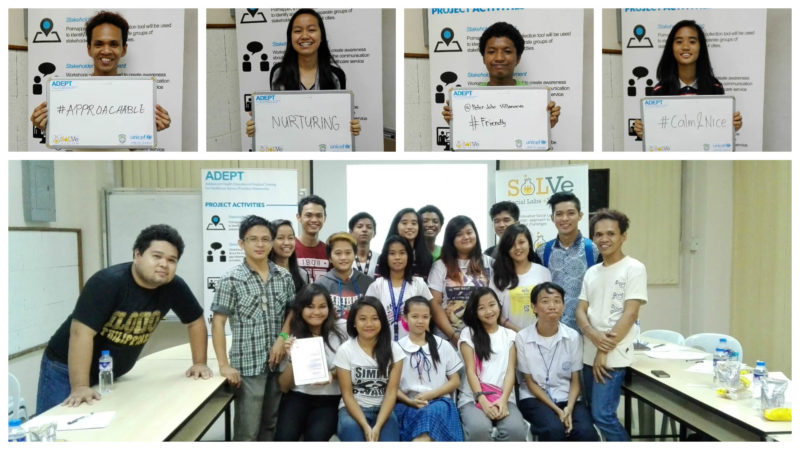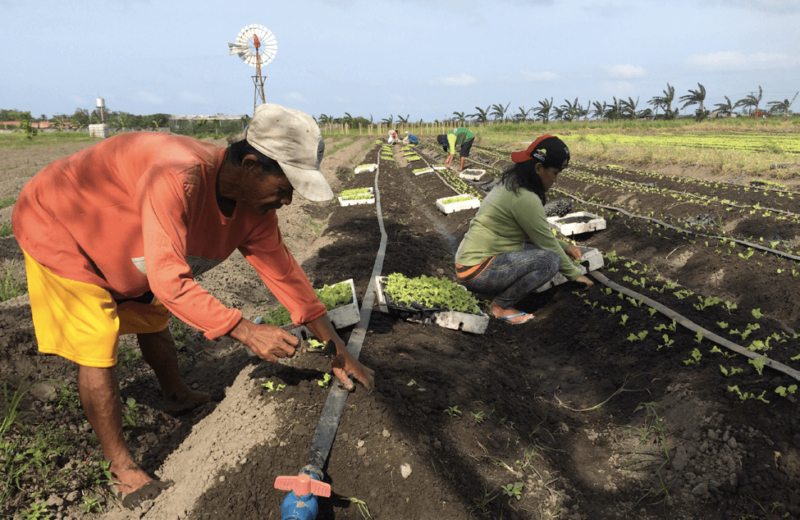
Adolescence is a critical time when the youth are interested in important issues such as reproductive health. However, engaging with them has proved to be a challenge for healthcare workers. ADEPT aims to bridge this communication gap by providing healthcare service providers in four key cities in the Visayas with an e-learning toolkit that they can access at their convenience. The one-year initiative equips healthcare workers to provide the youth with information on reproductive services available for them thus, enabling them to make informed decisions about their health and welfare.
ASSIST developed a video-based e-learning toolkit for healthcare professionals in Borongan, Iloilo, Roxas, and Tacloban. The platforms provided them with relevant healthcare data gathered from the conduct of stakeholder mapping. ADEPT also became a platform for youth groups and adolescent health care providers to interact and access resources on reproductive healthcare.
In developing the toolkit, ASSIST conducted: (1) Stakeholder Mapping to engage groups of key stakeholders in the project sites; (2) Stakeholder Engagement wherein one-day workshops were conducted in each of the cities to build awareness on the importance of adequate communication between healthcare professionals and the youth; (3) e-Learning Tool Design, Production and Launch wherein the development of the toolkit was based on the inputs from stakeholder consultations; and (4) Training of Trainers (ToT) Workshops where healthcare service providers were equipped in the application of the toolkit in their engagement with the youth.
In a bid to extend financial inclusion to remote areas in the Philippines, the CAN program of the Grameen Foundation aims to build a network of financial agents in rural villages of Panay Island. The project enabled sari-sari store owners, mostly stay-at-home mothers, to offer a range of financial services to their villages.
ASSIST developed two interactive, web-based e-learning courses to equip sari-sari store owners to become a financial agent which can be accessed through Android-based tablets. Course One teaches the owners to use the digital payment center device called Ka-Pos!ble!; and Course Two is an engaging, easy-to-understand module on encouraging financial literacy among micro-vendors who used digital payment devices called Digi-tindahan. ASSIST designed and developed the storyboard, script, graphics, animations, and videos for both the following courses.
The Department of Health (DOH), with the support of the World Health Organization – Philippines Country Office (WHO-PHL), led the development of a Manual of Operations for the Adolescent Health and Development Program. The Manual serves as a guide for program managers, coordinators and implementers in operationalizing the National Policy and Strategic Framework on Adolescent Health and Development (AHDP).
To enable the Department of Health to develop an appropriate, effective and sustainable adolescent health and development program, a manual of operations has been developed and ready for print layouts. ASSIST was contracted to provide the layout and design services for this publication. Aside from leading the creative design, ASSIST also reviewed relevant photos and conducted photo shoots to provide the publication with useful visuals,\ and closely coordinated with different DOH units and stakeholders for technical inputs.
It is shown that limited access to financial services constrains economic growth in the Philippines. This is especially true for lower socio-economic groups, including microenterprises, which must then turn to moneylenders, pawnshops or lending investors for credit instead of formal institutions for credit. USAID’s Microenterprise Access to Banking Services (MABS) Program targets these lower socio-economic groups and micro-entrepreneurs by working with rural banks to reach such groups in a profitable, but equitable, manner.
ASSIST with support from USAID implemented the “Micro-Enterprises Access to Banking Services (MABS) – Digitization of Learning Content” project, with the aim to accelerate national economic transformation by encouraging the Philippine rural banking industry to significantly expand access to microfinance services. They were tasked to expand the provision of financial services, both lending and deposit mobilization, to micro-entrepreneurs and other groups at the lower socio-economic levels in the Philippines through existing networks of rural and cooperative rural banks.
The project was able to achieve the development of distance learning modules, results-based training courses for staff of MABS participating rural banks and made these available both online and on CDs. It also created seven distance learning course materials in both CD and online format and microfinance officers of 350 rural banks acquired necessary technical knowledge and skills to carry out their jobs.
The Community-Based Monitoring System (CBMS) is a tool introduced by UNDP and DILG to local government units to diagnose the extent and causes of poverty in an area, to help in formulating policies and programs, to aid in identifying target beneficiaries and to facilitate assessment of the impact of those policies and programs. In Misamis Oriental, which registered a 28.5% poverty incidence, 14 municipalities have started to adopt and implement the CBMS to attain poverty reduction. However, those municipalities cannot fully utilize the system due to lack of capacity and resources to validate and process the data into a development planning tool with a geographic information system.
Jointly funded by STEAG State Power Inc. and DEG, EMPOWER aimed to achieve economic growth in the region by enabling local government units to acquire necessary technical skills and know-how in utilizing development tools. The project addressed the gaps in fully utilizing development tools particularly, in transferring and sustaining practical knowledge in using CBMS and GIS.
The project’s focus was on updating the database and information system of the Provincial Planning Office of Misamis Oriental and Cagayan de Oro City Planning Office. Six municipalities from Misamis Oriental namely, Tagoloan, Jasaan, El Salvador, Medina, Opol, and Laguindingan, had been designated to be pilot areas for CBMS implementation considering the areas’ strategic importance to the industrialization and eco-tourism potential of Northern Mindanao. The works under this project include Training and Assessment of CBMS implementation, Determination of GIS requirements and correspondent GIS Technical Trainings, CBMS and GIS integration, data processing, analysis and publication of case studies.
Micro, small and medium enterprises (MSMEs) account for a large majority of establishments in the Philippines, employing 70% of the total labor force. Undeniably, MSMEs constitute the backbone of the economy, playing a key role in the country’s growth and development. Nevertheless, local MSMEs in food production and processing have a small presence in the Philippine market. Most food products available in local retail chains are produced in neighboring Asian countries. The problem is that development of the sector is hindered by uncoordinated and outdated professional and technical qualifications for MSMEs as well as a lack of adequate public action against noncompliance with food regulations and standards.
ASSIST partnered with TÜV Rheinland, SEQUA, the University of the Philippines Institute for Small Scale Industries (UP-ISSI) and AFOS Foundation for Entrepreneurial Development Cooperation to implement Pro-FIT. The project aimed to enhance the capacity of local MSMEs in the food and beverage industry, to improve competitiveness in local and foreign markets. This was done by creating awareness and addressing the benefits of food safety regulations and standards, and implementing a variety of qualification courses on food safety regulations and standards through the coordinated effort from relevant stakeholders.
By the end of the project, five courses were developed with curriculum and training materials for the pilot implementation and certification of the diploma courses. These courses included Certified Quality Associate, Diploma in Food Safety Management, Certification Programme on Good Manufacturing Practices, Certified Food Safety Professional and Basics of Food Safety, and Hygiene and Food Handling; and have been absorbed into UP-ISSI’s regular course offerings to students. ASSIST and partners also executed Train-the-Trainer workshops for 30 trainers coming from UP-ISSI, the Philippine Technical Education and Skills Development Authority, Philippine Trade Training Center and other TVET centers in the country. Additionally, basic courses were administered to 200 operators from 10 MSMEs. The overall impact of this project increases the chances of MSMEs in the food and beverage sector to better enter domestic and foreign markets and contribute to the growing economy of the Philippines.

Micro, small and medium enterprises (MSMEs) are key to the Philippines’ economic growth and development. They accounted for 99.5% of the total business establishments in the country in 2016 and 14% of these MSMEs were engaged in manufacturing and food processing. With a vital role in the global economy, it is essential to push MSMEs to converting traditional operational processes into green and sustainable practices.
In 2016, the Global Green Growth Institute (GGGI) and the Department of Trade and Industry of the Philippines launched a collaborative initiative to develop business case studies for greening practices of MSME operations, which was executed by ASSIST and GGGI. This study was conducted with the aim to encourage MSMEs in the Philippines to start incorporating greening practices in their production/manufacturing processes by sharing and promoting stories from pioneering individuals on how their committed actions to protect the surrounding environment and resources were beneficial financially and socially.
The case study contains assessment results of ongoing best greening efforts being practiced among twelve MSMEs from selected food processing industries: coffee, cacao, processed fruits and nuts. Greening efforts taken from the twelve include waste recycling and reusing, energy saving and emission reduction, water saving, and innovation and research.



